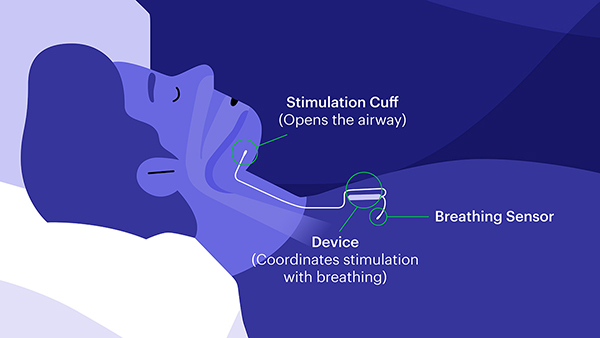Obstructive sleep apnea (OSA) is a common condition characterized by repeated episodes of partial or complete upper airway obstruction during sleep, leading to intermittent cessation of breathing and subsequent drops in blood oxygen levels. While continuous positive airway pressure (CPAP) is the gold standard treatment for OSA, not all patients can tolerate it, and alternative treatment options are needed.
What is Hypoglossal Nerve Stimulation?
Hypoglossal nerve stimulation (HNS), also known as Inspire sleep therapy, is a relatively new and minimally-invasive procedure that has shown promising results in the treatment of OSA.
The hypoglossal nerve is a cranial nerve that controls the movement of your tongue and other muscles involved in swallowing and speech.
Hypoglossal nerve stimulation involves the implantation of a small, FDA-approved device, currently developed by Inspire Medical Systems, that delivers mild electrical impulses to the hypoglossal nerve during sleep, which in turn activates the muscles of the tongue and other airway muscles to keep the airway open and prevent episodes of apnea.
The HNS device consists of three components: a pulse generator, a breathing sensor, and a stimulation lead. The pulse generator is implanted under the skin in the chest, while the stimulation lead is placed around the hypoglossal nerve in the neck. The breathing sensor is placed through the same incision as the pulse generator in the chest.
How Does Inspire Therapy Work?
During sleep, when the breathing sensor detects that you are inhaling, the pulse generator delivers a mild electrical impulse to the hypoglossal nerve, which in turn activates the muscles of your tongue and other airway muscles to prevent the airway from collapsing. When you exhale, the electrical impulse stops, and your muscles relax.

The level of stimulation is customized to each patient's needs and can be adjusted by the physician as needed. The patient can also turn the device on or off and adjust the stimulation level using a remote control.
Learn more about Inspire therapy.
What are the Benefits of Hypoglossal Nerve Stimulation?
Clinical studies have shown that HNS can significantly reduce the frequency and severity of obstructive sleep apnea events and improve the quality of sleep in patients who are unable to tolerate CPAP or other treatments. In addition, HNS has been shown to improve daytime sleepiness, cognitive function, and quality of life.
HNS, or Inspire sleep therapy, is minimally invasive and can be performed as an outpatient procedure. The recovery time is relatively short, and most patients are able to return to normal activities within a week or two after the procedure.
Are There Risks to Hypoglossal Nerve Stimulation?
As with any medical procedure, there are risks associated with hypoglossal nerve stimulation implant placement. The most common risks include infection, bleeding, pain, and discomfort at the site of the implant. In rare cases, the device may malfunction, and additional surgery may be required to repair or replace it.
Is Inspire Therapy Right for Me?
Hypoglossal nerve stimulation is a promising treatment option for patients with obstructive sleep apnea who are unable to tolerate CPAP or other treatments. However, it is not suitable for everyone, and a thorough evaluation by an expert sleep specialist is necessary to determine if you qualify for the treatment.
If you have obstructive sleep apnea and are interested in hypoglossal nerve stimulation, contact us today.
Why Choose UHealth?
Experienced pediatric and adult sleep surgeons. You can be confident your surgery is performed by board-certified sleep surgeons. Whatever the procedure, you receive the right care for the best outcomes.
Innovative minimally invasive procedures for sleep disorders. We always choose the least invasive techniques to effectively treat your condition — which means less pain and a quicker recovery. Our sleep surgeons also offer the most advanced techniques like upper airway or hypoglossal stimulation for obstructive sleep apnea.
Combined surgeries for better outcomes. We understand the various causes of sleep-disordered breathing problems and perform expert procedures at the same time whenever possible. Some procedures can be combined or performed with other techniques for various levels of airway obstruction, such as nasal or palate surgery.
Questions? We're here to help.
Our appointment specialists are ready to help you find what you need. Contact us today.